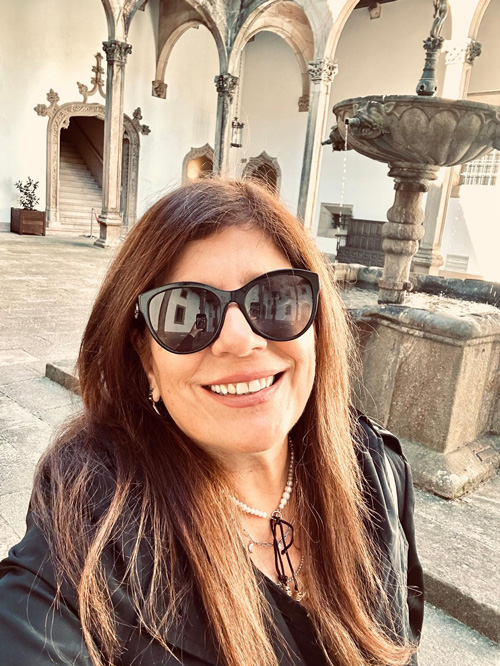She felt the music fade away in her world. The music that had always been the backing track of joy, good living, and gratitude at every step. Her only son died at 33, and everything around her fell silent.
It was a death without warning. He literally died suddenly after a harmful effect caused by a suspected vaccine. As a healthcare professional, knowledgeable about the functioning of the body’s organs, she accepted it: the heart attack was devastating.
Also devastating was the test of surviving a death that is not a law of life. Because we are taught, says Dr. Carmen Medina, “to talk about life, but not about death, and it is important to understand death in order to understand life. To learn to feel beyond this space, to be able to love, and to learn to embrace in physical absence.”
Not even three minutes had passed when, as I sat in his office—surrounded by colorful hoops, swings, medicine balls, and cots—he said to me: “Your son is very special. I never told you, but every time I saw him, he brought a smile to my face—he’s sweet, just like mine. Thank you for that.”
As mothers, our souls are crushed, our lives are squeezed. Understanding that our life journey transcended a doctor-patient relationship, we transferred our connection to a humanitarian plane.
They were Bibiana and Carmen, a first-rate therapist, who, over time, listened to music again. Today, she allows herself to curl up in it as joy, as gratitude, Caribe.
Her courage is commendable. It’s admirable.
Although her only son had died during the pandemic, in his adolescence he was on the verge of death after an accident at sea. He was a boy into extreme sports, especially when it came to nautical activities, and jumping into the void left him almost paraplegic. Fortunately, after marathon surgeries and intensive care, her son made a full recovery.
But the trauma of seeing her son survive had a complex family aftermath: their marriage didn’t survive the accident. They were consumed by the uncertainty of the process. They accepted it and amiably diverged, maintaining their role as parents and friends as their guiding light.
Navigating the uncertain waters was an odyssey. But having a spiritual foundation whose mantra is “anything is possible” was a lifeline. Even if it meant remaining silent to calm the waters, to gather strength. She builds her strength by focusing on herself, on her work, on her various loves – dancing, the beach, reading – and watching, alongside her team, children and young people overcome difficulties.
That destiny of swimming, regardless of the style—freestyle, backstroke, frog, or almost drowned—until reaching the shore, makes her tenacious.
A tenacity that has existed since birth. Her family is from Caguas, and in her home, academic excellence and community service were always her hallmarks. She graduated with excellent grades from Notre Dame and attended the University of Puerto Rico to study medicine.
However, she decided to enter the field of therapy because of her attention to care and the details of progress. Today, she is the best ally of doctors because she believes in collaboration when building bridges due to bureaucracy is hard work.
Later, Carmen obtained a scholarship to Boston University and completed her master’s degree. She lived in the cold, a little fearful of her English proficiency, but she succeeded. And she delved into the field of biomechanics—because she is a woman who sees what few see until she deciphers it.
This new field in healthcare strengthens her sixth sense when connecting the dots in each patient’s development. Carmen is fastidious in stitching and unstitching until she weaves an anatomical map of what can best be aligned to achieve optimal progress for her patients and families.
Fascinated by the health sciences, she pursued postgraduate studies at Lomas Linda University in California, and together with three other women, they patented BioTots – a splint created to help infants and children with various conditions overcome their challenges by using science to serve their well-being.
Her best advice for family members or caregivers of her patients is to share the burden because progress is not linear. Being emotionally prepared for any detour is essential. It is a collective race, not an individual one, in which she and her team will always be on the sidelines.
She has been working in Puerto Rico for more than three decades – where she daily tries to balance the abundance of therapies, leading and managing her office, being a speaker, and juggling her personal life.
Today she lives ‘in peace and plenitude.’ Her husband and son are a thing of the past and present. She continues to enjoy her work and thanks her sister – her polar opposite – for being her support.
Time passes, and it’s time to welcome a baby. We say goodbye with the promise of a visit from my sweet son. And I reaffirm to myself that Carmen is a woman with a profound cadence.



